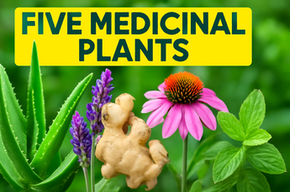Medicinal plants have been an integral part of traditional medicine for centuries. Known for their healing properties, 5 medicinal plants and their uses offer numerous health benefits that modern science continues to validate. In this article, we’ll explore 5 medicinal plants and their uses, revealing how these plants have stood the test of time for promoting health and wellness.

1. Aloe Vera: The Skin Healer
Uses of Aloe Vera
Aloe Vera is one of the most well-known and widely used medicinal plants. As one of the 5 medicinal plants and their uses, Aloe Vera has earned a reputation for its soothing and healing properties, especially for the skin. Aloe Vera gel is extracted from the leaves of the plant and has been used for centuries to treat burns, wounds, and other skin irritations.
- Skin Care: Aloe Vera is commonly used in lotions, gels, and creams for its ability to moisturize and soothe irritated skin. It is especially effective for treating sunburns, acne, and dry skin.
- Digestive Aid: Aloe Vera juice can also help with digestion and detoxification. It has mild laxative properties, which help relieve constipation.
- Anti-inflammatory: The compounds in Aloe Vera help reduce inflammation, making it an excellent option for treating arthritis and joint pain. For more info
2. Lavender: A Calming Herb for Relaxation
Uses of Lavender
Lavender is a fragrant herb that offers more than just its pleasant scent. As one of the 5 medicinal plants and their uses, lavender has powerful properties that can aid in relaxation and stress relief. Lavender is often used in essential oils, teas, and bath products for its calming effects.
- Stress Relief: Lavender is often used to reduce anxiety and promote relaxation. Its soothing scent is known to relieve stress and improve sleep quality.
- Pain Relief: Lavender oil can help alleviate headaches, muscle tension, and even minor burns. Its anti-inflammatory properties contribute to its pain-relieving effects.
- Skin Treatment: Lavender oil can be applied topically to treat skin conditions like acne and eczema due to its antimicrobial and anti-inflammatory properties. For more info
3. Ginger: A Natural Remedy for Digestion
Uses of Ginger
Ginger, a powerful root, is another of the 5 medicinal plants and their uses that has gained popularity for its digestive and medicinal properties. It is widely known for its ability to promote digestion and relieve nausea.
- Digestive Aid: Ginger is renowned for its ability to reduce nausea, improve digestion, and relieve indigestion. It’s a natural remedy for motion sickness and is often recommended for morning sickness during pregnancy.
- Anti-inflammatory: Ginger contains gingerol, a compound with anti-inflammatory properties that help treat conditions like arthritis and muscle pain.
- Immune Booster: Ginger also supports the immune system, making it a popular remedy during cold and flu season. For more info
4. Echinacea: Strengthening the Immune System
Uses of Echinacea
Echinacea, a flowering plant native to North America, is widely regarded as one of the 5 medicinal plants and their uses that can help strengthen the immune system. Echinacea is used in both its root and flower forms to support the body’s natural defense mechanisms.
Wound Healing: Echinacea has been used for centuries to promote the healing of cuts, scrapes, and wounds, thanks to its antibacterial properties.
Cold and Flu Relief: Echinacea is used to prevent and reduce symptoms of the common cold and flu. It boosts the body’s immune response and helps fight infections.
Anti-inflammatory: Echinacea is also known for its anti-inflammatory properties, helping alleviate symptoms of arthritis and other inflammatory conditions. For more info
5. Peppermint: The Cooling Herb for Health
Uses of Peppermint
Peppermint, known for its cooling and refreshing properties, is one of the 5 medicinal plants and their uses with a variety of health benefits. From aiding digestion to providing relief for headaches, peppermint offers natural remedies that have been trusted for generations.
Respiratory Support: Menthol, found in peppermint, helps open airways, making it an effective remedy for cold, cough, and sinus congestion.
Digestive Health: Peppermint is commonly used to relieve indigestion, bloating, and gas. It is also beneficial for those suffering from irritable bowel syndrome (IBS).
Pain Relief: Peppermint oil, applied topically, has a cooling effect that can relieve headaches, migraines, and muscle pain. for more info
FAQs about 5 Medicinal Plants and Their Uses
FAQs about Medicinal Plants and Their Uses
1. How do medicinal plants work for healing?
Medicinal plants work through their natural compounds, which interact with the body to alleviate symptoms, boost immunity, or promote healing. The 5 medicinal plants and their uses provide a range of natural therapies that support the body’s ability to heal.
2. Can medicinal plants be used alongside prescription medication?
It is always advisable to consult a healthcare provider before using medicinal plants alongside prescription medications. Some herbs may interact with medications, potentially affecting their effectiveness or causing side effects.
3. Are all medicinal plants safe to use?
Not all medicinal plants are safe for everyone. Some may cause allergic reactions or interfere with existing health conditions. Always research and consult a healthcare professional before using new medicinal plants.
4. What are the best ways to use medicinal plants?
Medicinal plants can be used in various forms such as teas, capsules, tinctures, oils, and topical treatments. The best form depends on the plant and the condition being treated.
5. Where can I find medicinal plants?
You can find medicinal plants at health food stores, online, or even grow your own in a garden. It’s important to source plants from reputable suppliers to ensure quality and safety.
6. What are the benefits of using medicinal plants over pharmaceuticals?
Medicinal plants offer natural healing with fewer side effects compared to synthetic pharmaceuticals. They help the body heal itself without the risk of harsh chemicals or synthetic additives.
For related articles, contents ,Valuable Resources and informations also visit the Sarakarihub.com
